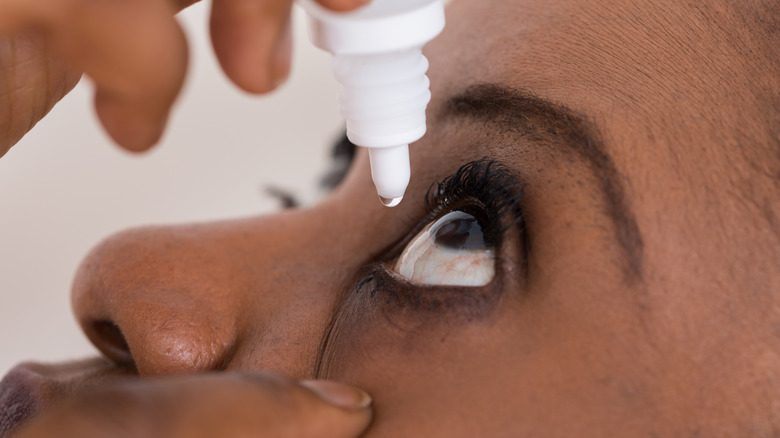The First Thing You Should Do If You Get Sand In Your Eyes
Many of the 'perfect day' scenarios most of us could dream up involve sand — a day relaxing at the beach, hiking along a pristine coastline, or playing golf with friends. It's almost guaranteed that, sooner or later, a grain or two of that lovely sand will get in your eyes while enjoying one of these activities. Nothing can ruin the enjoyment of the moment faster than that intense irritation, so the next time it happens, stay calm and keep these tips in mind.
Don't panic and rub. Even though your natural instinct is to touch your eye, hold back and refrain from scratching. Ophthalmologist Peter McGannon, M.D., notes, "Whether it's a grain of sand, eyelash, or other tiny object, your first instinct may be to rub your eye, but don't do it" (via Cleveland Clinic). You could actually make matters worse by scratching the cornea and even setting yourself up for an infection.
The eyes have a built-in system for flushing out foreign objects — a waterfall of tears that are very effective at dislodging the occasional grain of sand. In most cases, all we need to do is aid the body in its natural process of ridding our eyes of contaminants.
Flushing out the eye with saline or water can help
First, wash your hands well to prevent any bacteria from getting into the eye. Next, if you're wearing contact lenses, carefully remove them. If your natural tear production hasn't yet done the trick, then lie down or tilt your head back, open the eye wide, and gently run saline solution (or clean water) over the eye. You can also try gently lifting the upper eyelid over the lower lid. In dong so, your lower eyelashes will act similarly to a feather duster and delicately rid the eye of any painful particles (via Healthline).
Another option is to use an eye cup to help flush the eye out. Take a clean cup or container, fill it to the top with saline or clean water, lower your eye into the cup, and blink several times for about 10 to 15 seconds (via AZCentral).
A grain of sand in the eye usually comes out easily on its own and is not a medical emergency. If the particle doesn't flush out easily however, or if the eye continues to be painful, your vision is blurry, or the eye becomes red, swollen, or develops pus or discharge, it's time to see a medical professional.


